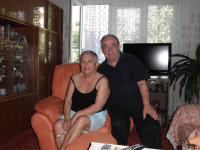Georgios Karanikos
* 1934
-
"We communists have made quite a lot of big mistakes. If they'd loosened things up for people like it was in Yugoslavia, say, it could've gone differently. They should've allowed people to travel when they wanted to. On the other hand the world was divided into two camps, so it was hard, but it could've been done. People certainly wouldn't have left the country, they'd have maybe moved for a job, and then have came back."
-
"I have more of a Czech mentality now. They give me odd looks in Greece. I have a completely different mentality than Greeks do. But then again I know how to adapt." (Q: "Have you ever considered returning to Greece?") "Sometimes yes, but I wouldn't do it for the children's sake. I didn't want them to end up in a foreign country like I did. When we could've returned, the time was bad, the girls were at school. When the girls heard 'Greece', they would tremble with fear. People who were born in Czechoslovakia and moved to Greece often came back again. They got used to the Czech way of life, and it's a completely different mentality in the Balkans."
-
"They handled us excellently. They gave us whatever we asked for. I can't complain about the Czech Republic. They behaved to us like to their own children."
-
"I never gave my children even a slap. I didn't want my girls to have what I'd been through. In Greece, I'd been slapped by everyone. That was the kind of times it was then. I remember when the Germans left, I was ten or eleven years old, we hid, but they found us. I still remember their shouts in German, hands up."
-
"We also had Russian lessons. The teacher came in, I didn't have a clue we had Russian, she called me to the blackboard. She saw the name Karanikos and thought I was Russian. I still remember how she sat me down with a five [an F mark - transl.]. My classmate told me to learn the Russian poem "Ptička letala, ptička igrala" ["The bird flew, the bird sang" - transl.], that I'll be examined again next lesson. So I had to learn azbuka and the Latin alphabet in a week. It was hell. I had no idea how I'd manage it in time. In the end I did manage it, awfully badly, but I managed."
-
"I looked after him and led him along. I had to take care of him. My brother was four years the younger. We were children. I was afraid that something might happen to him. I was the most afraid when we were in Carlsbad for a time. He fell ill, I think he had jaundice. I didn't know where he was. They didn't tell me till later that he was in hospital. Well, and this one family wanted to adopt him. He was nine or ten years old at the time, and he was very cute. I asked him where he was going. He told me they wanted him. He had learnt a bit of Czech while in the hospital. I said to him: 'Oh no you don't, boy.' If they'd adopted him, I wouldn't have had a brother. Then your mail would be waiting for me."
-
Full recordings
-
v Praze, 09.07.2010
(audio)
duration: 54:27
Full recordings are available only for logged users.
After what I’ve seen and been through, I have to be a communist.
Georgios Karanikos was born in 1934 in the village of Dilofos in northern Greece. In 1947 he was forced to leave his home with his younger brother and live in Albania for half a year. A year later he left Greece for good. He ended up in a children’s home in Ostrava. His mother had died during the civil war. His father arrived in Czechoslovakia towards the end of 1949, but he returned to Greece in his old age. Georgios graduated from a chemistry school in Pardubice. It was there he found his Greek wife Violeta who came to visit her mother in 1963. He married her at the age of 33. They then moved to Prague. They have two daughters. In Prague, Georgios worked as a foreman at a chemical co-op. He has been on pension for the past five years (as of 2010). He was a member of the Communist Party of Greece until its dissolution. He had considered returning to Greece, but decided to stay in the end because of his children. He visits his sister in Greece for two months every year. Although the Greek mentality is close to his heart, he feels at home in the Czech Republic.
